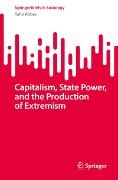Read more
List of contents
Introduction: Towards a Marxist Theory of Radicalisation.- Capitalism and the Production of Inequality: Laying the Groundwork for Radicalisation.- The State, Counterterrorism, and the Reproduction of Inequality.- Global Capitalism and the Rise of Transnational Radicalisation.- Intersectionality and Radicalisation: Class, Race, and Religion.- Case Study: Economic Deprivation and the Rise of Islamist Extremism.- Case Study: Social Alienation and the Far-Right Resurgence.- Critique of Liberal Approaches to Countering Violent Extremism.Beyond Capitalism: Imagining Alternative Futures.- Towards a More Just and Peaceful World.
About the author
Tahir Abbas, PhD, is a Professor of Criminology and Global Justice at the Department of Society and Politics at Aston University in the UK. He was formerly the Professor of Radicalisation Studies, having joined the Institute of Security and Global Affairs of Leiden University in the Netherlands in 2018. Previously, he was a Professor of Sociology at Istanbul University (2010-2016) and an Associate Professor in Sociology and Director of the Centre for the Study of Ethnicity and Culture at the University of Birmingham (2003-2009). He works in sociology and critical terrorism studies in exploring various forms of ‘radicalisation’. His most recent books areCountering Violent Extremism (Bloomsbury, 2021), a critique of policy and practice within this field, and Islamophobia and Radicalisation: A Vicious Cycle (Hurst/ Oxford University Press, 2019). His other recent books includeContemporary Turkey in Conflict (Edinburgh University Press, 2017). His recent peer-reviewed journal articles have appeared in Ethnic and Racial Studies, British Journal of Sociology of Education, Critical Social Policy, Critical Studies on Terrorism, Ethnicities, and Philosophy and Social Criticism. As a visiting scholar, Tahir has been affiliated with several prestigious institutions, including the University of Exeter Institute of Arab and Islamic Studies (2023-), London School of Economics Department of Government (2017–2019), the New York University Remarque Institute (2015– 2016), the Syarif Hidayatullah State Islamic University Graduate School for Islamic Studies in Jakarta (2012), the University of Oxford Centre for Islamic Studies (2007–2009), and the University of Warwick Centre for Research in Ethnic Relations (1999-2001).
Tahir is a Fellow of the Royal Society of Arts and a Fellow of the Academy of Social Sciences. He was the Scientific Coordinator of the EU-funded H2020 RIA Drive project; a 42-month project exploring how social exclusion impacts the radicalisation of far-right and Islamist groups in the Netherlands, Denmark, Norway and the United Kingdom. He led the DRIVE consortium (January 2021-June 2024) out of Leiden University in partnership with Aarhus University, Umeå University, University of Cambridge, University of Liverpool and the University of Oslo. He was also the principal investigator on the EC-funded Protone project, which explores protecting religious spaces of worship in Europe, and a co-investigator on the EC-funded project Prepare, which generates a proof of concept concerning young people and families who are returnees from countries of conflict.
Summary
This book develops a comprehensive Marxist theory of radicalisation, synthesising and extending the author's two decades of research in the field. The central argument of this book is that radicalisation cannot be fully understood without examining the role of capitalism in creating and exacerbating the social, economic, and political conditions that give rise to it. It contends that: radicalisation is fundamentally a product of the contradictions inherent in the capitalist mode of production, particularly in its neoliberal phase; that the intensification of exploitation, alienation, and social atomisation under neoliberal capitalism creates the structural conditions for various forms of radicalisation; state responses to radicalisation, rooted in the logic of capital and often employing repressive measures, tend to reproduce and amplify the very conditions they seek to address; and processes of radicalisation are shaped by the complex interplay of global capitalist dynamics and local social, cultural, and political contexts. Therefore, effective approaches to countering radicalisation must address root causes by challenging the fundamental structures of capitalist society.
In systematically situating empirical insights and theoretical contributions within a broader Marxist framework, the book offers a novel and timely intervention in the field of radicalisation studies. It provides scholars, students, and practitioners with a powerful framework for understanding and addressing one of the most pressing issues of our time, and not only advances academic debates but also contributes to broader struggles for social justice and equality.

